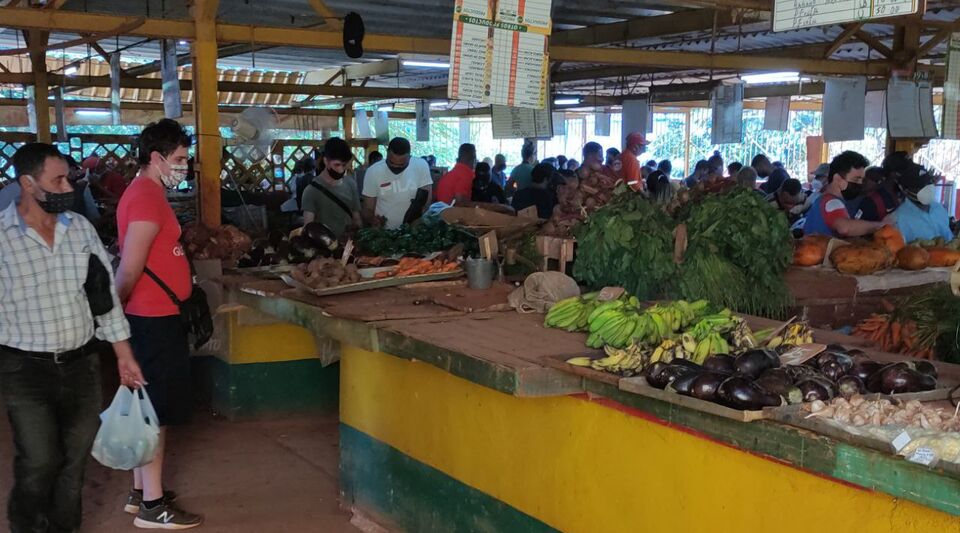What is expected this season, when temperatures begin to drop in Cuba, is that the tomatoes reach the markets. However, this year, the fruit is absent from many agricultural platforms in Havana. The reason: the daily police raidslaunched a few days ago, against the high prices, and the decision of the merchants to withdraw the product so as not to sell it at a loss.
“In all this market there is no one selling tomatoes,” declared this Sunday morning a young man who manages one of the platforms at the premises of the Youth Labor Army (EJT) on Tulipán street, in Nuevo Vedado. “They have told us that we cannot sell it for more than 200 pesos a pound and that amount does not give us business,” he adds to 14ymedio.
In the different kiosks located in the EJT market, this weekend you could see donkey bananas, cabbage, sweet potatoes and joint garlic, but not the characteristic red color of tomatoes to make a tasty salad. “That product is candela. You earn a fine right away,” warned the young man.
“In order to recover the investment, the tomato must be sold right now between 250 and 270 pesos per pound”
“In order to recover the investment, the tomato must be sold right now between 250 and 270 pesos per pound,” explains Jorge, a 38-year-old from Havana who is dedicated to transporting goods from the Güira de Melena and Alquízar area, in the province from Artemisa, to the market on 19th and B in El Vedado. “Below that price I would already be working at a loss.”
The El Vedado store, known for its wide variety of products and high prices, is practically entirely privately managed and is governed by the law of supply and demand. An avocado costs 100 pesos, a pound of small onion costs 350 pesos, and a pound of cucumber costs 80 pesos, making a modest purchase in that market add up to a four-figure bill.
“Here they have come to try to pressure us to lower prices, but they are the same ones who later sell you beer in a state restaurant for more than 180 pesos,” laments Jorge. “For us, everything has also become more expensive, from the fuel that is obtained from the left to the price that the peasant puts on his harvest.”
“What people are doing is that they prefer not to bring some products for sale here in the place,” he explains to this newspaper. “If through digital sites where they buy from abroad for the family from here, it can be sold at a more reasonable price for us, what need is there to seek a fine by bringing the merchandise here?”
In portals aimed at emigrants, a pound of tomato is around 4 dollars, almost 500 pesos at the official exchange rate. Deliveries are made at home and the customer pays on-line with your credit or debit card. “You get rid of the inspectors, the police and having to hide the product every time you are notified of a raid,” explains Jorge. “If this continues like this, the only ones who are going to be able to eat a tomato salad will be those who have family in Miami.”
“That’s what they did to pork: they began to fine vendors and the result was that the pork in the markets was lost”
In markets like the EJT, run by the military, the pressures on traders are greater. “It is not that they have prohibited us from selling tomatoes, but it is as if they had, because they want to force us to keep the price low, but on the other hand when you ask them if there are capped prices they tell you no, that is not it, it is part of a battle against illegalities”, explains the intermediary.
For the official press, it is not a matter of recovering investments but of speculating. “In other words: it is about obtaining, by all those involved in the chain, logical profit margins, based on fair and reasonable sales prices, contrary to those who, with legal status or not, monopolize the productions, speculate and fleece the public without a minimum of modesty”, sentenced this Sunday the newspaper Granma.
“It is urgent to close all loopholes to the escape of products to illegal destinations, and call a chapter those who participate directly in the commercialization; be they markets, small squares, points of sale, forklift operators or street vendors,” threatened the official organ of the Party. Communist.
The offensive also extends to vendors who, like Dayron, offer their merchandise on a tricycle on a Havana street corner. “Last week they gave me a fine of 6,000 pesos that I still haven’t been able to pay. The inspector told me that I couldn’t have the onion leg at 1,000 pesos or the tomatoes at 220, as he had them.”
With his point of sale, Dayron walks through some parts of the Los Sitios neighborhood. “Now we have to move the tomato as if it were a lobster tail. More carefully and making sure that an inspector or a police officer does not approach,” laments the man. “I prefer that they spoil at home or that my wife has to turn them into puree, but at 150 or 180 pesos a pound I’m not going to sell them.”
And the merchant concludes: “That’s what they did to pork: they started fining vendors and the result was that the pig was lost from the markets. Now it’s up to the tomato and tomorrow the time will come at any something else, malanga or cucumber, it doesn’t matter because theirs is to want to control everything”.
________________________
Collaborate with our work:
The team of 14ymedio is committed to doing serious journalism that reflects the reality of deep Cuba. Thank you for joining us on this long road. We invite you to continue supporting us, but this time becoming a member of our journal. Together we can continue transforming journalism in Cuba.








